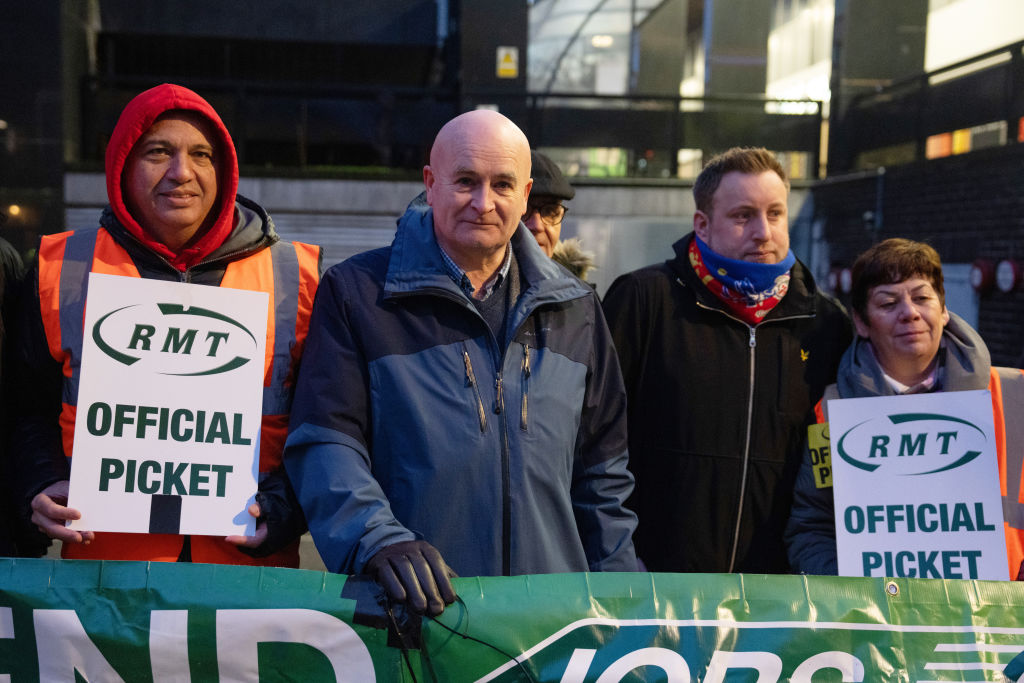The greatest danger presented by the rail strikes – for the Government, that is – has passed. The trade unions, chief among them the RMT, fronted by the alternately reasonable and hectoring Mick Lynch, threw everything they could at ministers in the run-up to the holidays. It did not work.
Much the same applies, to a greater or lesser degree, to other public sector strikes. There was a cynical – and concerted – attempt to use the Christmas and New Year break as an emotive deadline. This was apparently based on a gamble that enough of the public would blame the Government for ‘ruining Christmas’ to force a generous settlement. There were times when this looked set to become a general strike in all but name and it seemed the gamble could pay off.
In the end, though, ministers did not blink. With the holidays passed, there is no natural new deadline for the unions to focus on. They have lost much of any advantage they might have had. The Spring half-term and the Easter holidays are a long way away, and they won’t dare touch the Coronation, will they?
For all that the RMT is trying to maximise inconvenience while minimising pay losses to its members by calling two-day strikes with a pesky non-strike day or days in between (when all the trains are in the wrong places to run a proper service), the financial calculus will increasingly work against its members. There was a reason why the usually unflappable Mick Lynch took such umbrage when asked last month by the BBC’s Mishal Husain about his members’ losses compared with any gains they might win in a settlement. Nor are union resources infinite, even those of the RMT.
The lockdowns brought a change in attitude
So why didn’t the wave of Christmas strikes achieve their objective? Two words surely offer a large part of the explanation: Covid lockdowns. A by-product of the pandemic has been a big – and maybe lasting – change in working practices.
Significant numbers of people have either never returned to the office full-time or at all, or are equipped to work satisfactorily from home. They have the computer, the broadband, and the Zoom competence that makes it possible. They don’t have to get on that train – or go to an airport or wait for the postman. We learned how to work from home then, and we still know how to do it now, even if it is not our first choice.
The lockdowns also brought a change in attitude. People have become more resourceful, more self-reliant, and – to the chagrin of some employers – less biddable. Lockdowns also made parts of the private sector more nimble and creative, so that gaps left by Royal Mail – another organisation whose striking staff had banked on its supposedly unique clout in the Christmas calendar – were almost effortlessly filled by commercial operators.
Of course, working from home is not open to everyone. But the people it does affect might in the past have been the ones to object most loudly about the disruption to their commute and at the same time to express solidarity with the strikers. There was a lot less of that in recent weeks than there might have been pre-pandemic.
That may also have been, in part, because many of those unable to work from home – the shop workers, the leisure and hospitality staff, the gig workers etc – had no reason to feel particularly sympathetic to the strikers, their pay being all too often lower and their job security and pensions negligible. The claims by public sector workers that they are uniquely hard done by are likely to fall on deaf ears here. Thus has passed, perhaps forever, the working-class solidarity of yesteryear. No wonder Keir Starmer wasn’t keen on his MPs joining picket-lines.
The nurses’ strike has been an interesting case in point here. While public sympathy is greater than for other groups, their withdrawal of labour also passed with less public outcry, and so less trouble for the Government, than might have been expected. The plight of the NHS generally would appear to be so dire that people barely noticed that a proportion of nurses, or ambulance drivers, were not at work.
For someone who has broken their hip, it makes little difference whether the multi-hour wait for an ambulance is because the drivers are on strike or parked in an interminable queue for A&E. Nor does it really matter whether the subsequent wait for a hospital bed is because lack of social care is preventing discharges or because the number of nurses is depleted by a strike. The effect is the same: no service.
The same goes for Border Force. Where were all those queues of retuning holiday-makers at UK ports and airports after Christmas? Well, mostly there were none, because the army seems to have done a more efficient job at those airports where it was deployed than Border Force manages at less busy times. (The PM and others might now like to look up Ronald Reagan and US air traffic controllers in 1981 and ask whether the current set up, with unionised staff, is really the right arrangement for policing our borders.)
It would be wrong not to note the downsides to the pandemic changes, now more entrenched thanks to strikes in transport and the NHS. The railways – more eco-friendly than planes or cars – may be less viable if fewer people use them. Those employers hoping to persuade more of their staff back to the office may find it even harder than it was before. City centre commerce may not bounce back as fast as was hoped, if strikes keep more people at home. But the trade unions have lost their wager on a Christmas panic giving them what they want. That is a card they can no longer play.






Comments